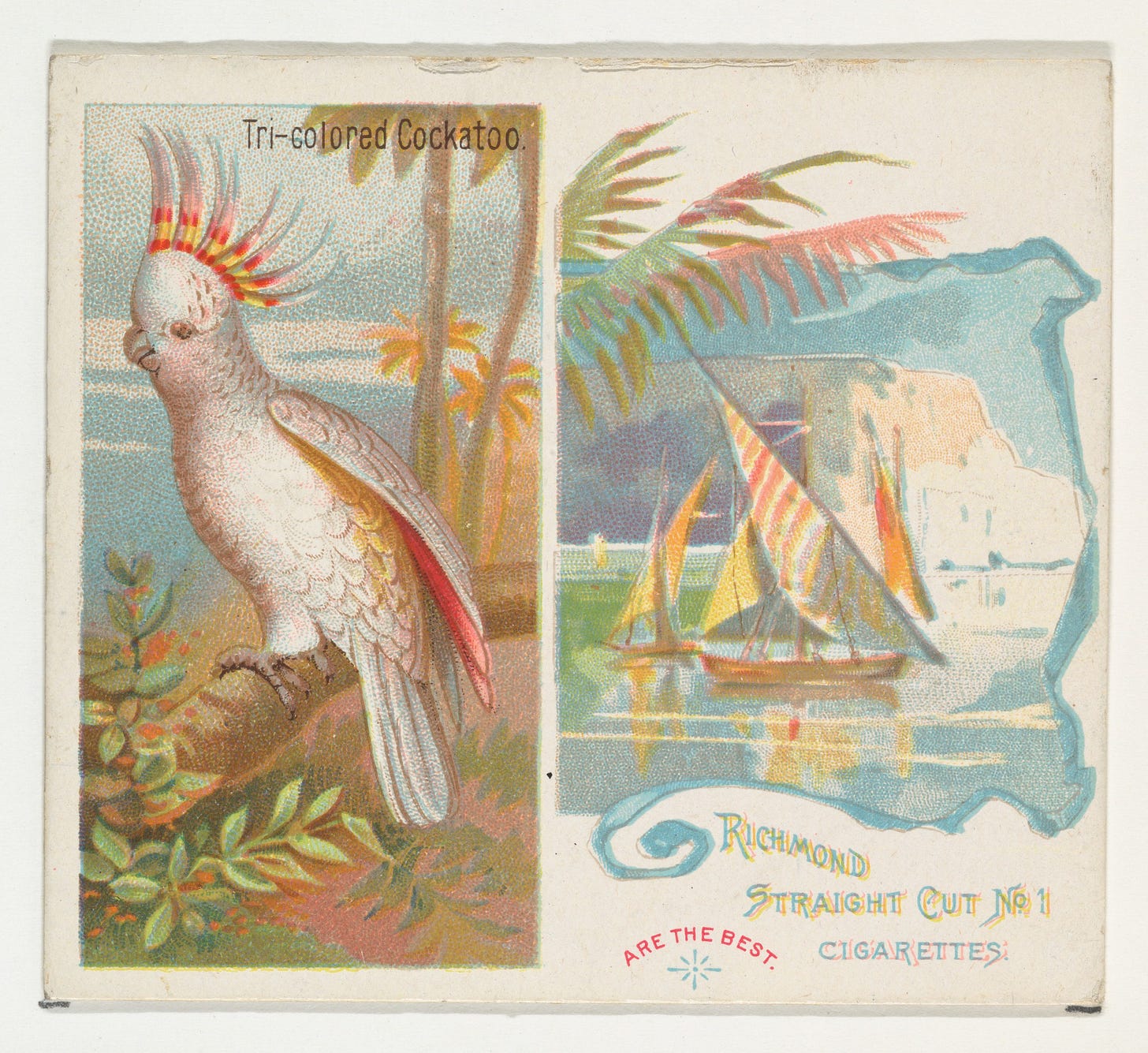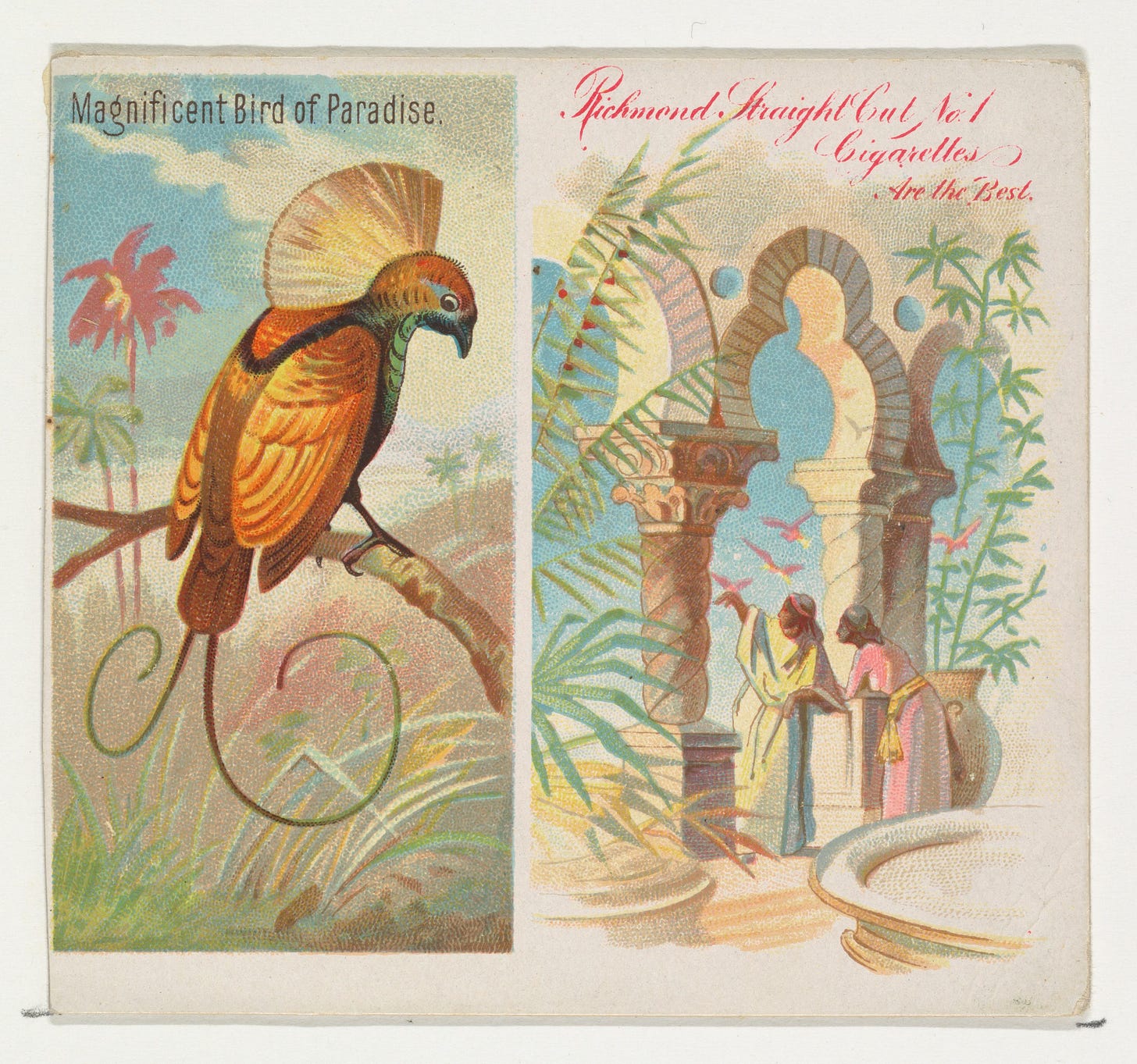Bask in your effort: a ritual
Become your own best creative strategist with this metacognitive reflection exercise
My yoga teacher guided us through a posture that made me shake a little toward the end.
Before the next pose, she said:
“Now: bask in your effort.”
Syrupy warmth spilled through my limbs, softening where it touched.
I’ve been thinking about this.
To bask in effort resists the cultural value system so many of us were raised in.
To bask in effort is to extend yourself the gift of not only witnessing your own conjuring, but luxuriating in it.
Unlearning Outcome-Attachment, Considering Effort
I’m sticky with the residue of years of learning and working in results-obsessed environments, and this season I’ve been working on remembering two things I used to know:
we do not control outcomes
the real magic comes from pursuit itself
As I’ve been musing on my teacher’s words, though, I’ve realized effort is tricky for me: I’ve tended to associate it with a level of struggle that I’d like to leave in the corporate world as well.
Sometimes the connection between effort and reward has seemed clear to me: improving core strength; expanding my skillset for the work I’ve chosen.
But I have also sometimes experienced effort as something that can be weaponized, even unintentionally. Maybe this is obvious, but I think effort as a concept can be misconceived as a means to one particular end that everyone should be able to reach: a mythical equalizer that overrides everything else. The bootstraps conversation. I may be particularly sensitive to this as someone who is neurodivergent and lives with chronic pain — both of which are invisible to others, for the most part. But I also know I’m far from alone in experiencing obstacles others don’t see.
My point is that effort is fundamental to getting where we want to go, but not to the exclusion of so, so many other things: love, understanding, equity, community, particular learning methods…
Effort as Essence as Energy as Elixir
So. I’d like to release the charge I’ve attached to this word.
And considering effort through the lens of something to bask in, I wondered if there were another view I could adopt. I looked at the etymology through my ancestral perspective, and I found brìgh listed in a 1902 Scottish-Gaelic dictionary as a word for effort.
Here’s where it gets interesting: effort is just one of the definitions.
Brìgh also means essence, energy, and elixir.
I fell in love with this layered meaning, which brings it closer to something I feel more drawn to bask in.
I was struck by an example phrase from the dictionary:
Craobh gun bhrìgh: a sapless tree.
Because: what is a tree without its essence? No sap, no life-force, no existance.
From this perspective, basking in effort can mean savoring your most fundamental essence, delighting in your own energy, steeping in your unique elixir.
It can be a gesture of awe toward our own here and now — instead of the usual reserving of appreciation for results. Simply: presence.
I think this is exactly what my yoga teacher was getting at, but I needed to update my own definition of the concept.
As I thought about what it might look like to bask in my effort outside of the yoga studio, I realized I’d been less than present this fall.
Truthfully, I’d been wishing for an extra summer. A second growing season, one with a bigger harvest. Because while I had big plans this year, it turned out summer did, too.
Between my grandmother passing away in June, staying on longer than planned at the job I was leaving, and unexpected health swings, I fully shifted from the flurry of summer activity I had anticipated to a tender and introspective season. It was beautiful, and it was inward.
When I re-emerged in early fall, I found a kind of anarchy had descended in my external world.
Squash beetles had skeletoned the leaves of our birdhouse gourds until most of the vines withered and fell to the earth without fruiting; the pale-peach calendula we started from seeds were crowding each other in competition for soil and sun.
Ideas I’d nurtured for months remained in my notebooks, unattended.
Everything, to me, seemed failed or unfinished.
But then --
Despite losing most of the crop, we harvested three birdhouse gourds and hung them to dry in our basement.
We thinned the calendula to give them space to soak in the season’s last warmth, draped their buds with burlap before the first frost, and have since been greeted, incredibly, with a scatter of late blooms -- in a deep sunset-orange, which, surprise, is an entirely different color than we believed we had planted.
I launched this Substack without having, quite honestly, a destination. I quietly offered smaller versions of the new services I had planned to launch. I’ve realized some ideas want darkness to germinate, not light -- and that’s okay.
What I’m saying is that there was still a harvest.
And when I looked closer at my efforts I felt had fallen short, but through the Scottish-Gaelic definition, I saw my past self differently.
From this perspective, effort seems more like being than doing: to apply effort would be to simply meet the world -- expected and unexpected -- with your essence. To be yourself.
And if that’s true, my efforts to meet my unanticipated summer seem exactly right. I may not have done much basking, but I was present with what showed up.
What if meeting what’s in front of you, exactly as you are, is enough? Always enough?
And what if, when we do feel a bit more spaciousness, we can choose to not only greet life’s offerings with presence but also bask in that experience?
A Nourishing Journaling Ritual
Effort-as-essence-as-energy-as-elixir.
I started to wonder if I could apply this idea, not only to the present moment but also as a way of processing past moments.
Reader, it changed me. I want to offer it to you.
I created this ritual to acknowledge the delicate space between harvest and hibernation. As we traditionally honor our ancestors during Samhain, this is an offering to your past self.
It’s an opportunity to warmly receive -- and celebrate -- the version of you that showed up this year.
But first: if your inner skeptic, like mine, loves to know why and how things work, this next section might help orient you.
What Research Says About Basking In Your Effort
Looking back at your year of results is a common practice, particularly for entrepreneurs and those in the business world. We look at data, build spreadsheets, analyze. It’s important.
But we’re not machines. We’re humans. Our creative process doesn’t run on a predictive language model like ChatGPT.
What happens around your creative thinking is influenced by your layers of life experience. You have preferences, and triggers, and deep emotional landscapes that affect you every moment of every day.
In contemplating effort, I wondered what I’d learn if I reflected purely on my experience of showing up.
I wondered: what could there be to gain by considering efforts irrespective of outcome? And to do this, not from a try-harder lens, but from a place of respect and tenderness. From the effort-as-essence perspective of bhrìgh.
I had a hunch.
But before I created the ritual you’ll find below, I pored through scientific studies: research helps me keep the peace between my pants-suit cynic and free-flowing mystic.
So. Here are two research-backed ways that celebrating your effort is deeply supportive and nourishing for your creative process.
With love, from my demanding inner skeptic to yours --
Reflecting on your experiences helps you become your own best strategist
The conscious consideration of your mental process on the deep level of sensation and emotion is called metacognitive reflection.
Defined with non-ridiculous words: this is the process of thinking about your own thinking.
Studies show that developing metacognition skills -- like honest self-reflection on your creative process -- not only helps you know yourself better but also significantly improves your capacity for problem-solving.
Metacognitive reflection isn’t about outcomes, or even your efforts themselves.
It’s the process of getting curious about your relationship with your efforts.
It involves considering what you encountered during an experience. Slippery things we tend not to talk about as much, particularly in the business world: how you, personally, made sense of something; how your environment affected you; what obstacles and emotions arose; why you quit something; what inspired you to keep going.
In the context of creative pursuits, observing your personal patterning and thought processes in this way helps you gain confidence in your ideas so you can become your own best strategist.
But first: adopt a growth mindset
Before you sit down for a metacognitive reflection session like the one I’ll share, it’s useful to first* adopt an attitude of what psychologist Carol Dweck calls “growth mindset.”
*If you read this and worry that you don’t yet have this attitude, know that metacognitive skills and adopting a growth mindset seem to work in a feedback loop in my experience. Working on either one helps the other.
Research on growth mindset suggests:
A fixed mindset and a growth mindset are two opposing attitudes we might have toward our own capacity for growth.
Those with a fixed mindset believe their skills and abilities -- those they perceive as good and bad -- are innate and immovable. A fixed mindset fosters a fear of failure and a valuing of results over effort.
Those with a growth mindset, on the other hand, believe they can improve and evolve their skills and abilities. A growth mindset fosters receptivity to feedback and challenges, and, crucially, finding reward in effort itself.
You might apply a growth mindset toward some aspects of yourself, but view other aspects of yourself as fixed.
Neither one is a fixed state of being: your mindset is malleable. A growth mindset is an aspect of your disposition that you can develop.
Having a growth mindset is a predictor of success. (!)
Think of it as the difference between telling yourself “I’m just not a cook” (fixed mindset) when you burn your first attempt at sourdough, versus thinking to yourself: “That was curious. I wonder what happened. I’ll get better as I experiment.” (growth mindset).
So what if we realize we have a fixed mindset toward an aspect of ourselves? How do we begin to shift our way of thinking in order to grow?
One researched-backed way is to reflect on your experience with your efforts themselves as distinct from any outcomes -- and further, to honor yourself for those efforts.
Truly, truly: please toast to your incredible efforts.
Research shows that rewarding yourself for effort as separate from outcome increases the likelihood you’ll take on -- and genuinely enjoy -- challenging tasks in the future. And developing your growth mindset through honoring your effort alone can motivate you to feel less daunted in the face of obstacles, making it more likely you’ll pick yourself up when you fall.
Ultimately, a growth mindset helps you develop perhaps the most invaluable edge in your creative pursuits: resilience.
Luxuriate in your creative efforts, says science, and future-you will thank you.
Bask In Your Effort: A Metacognitive Journal Ritual
Preparation
Set the Space
Choose a quiet, comfortable spot where you won’t be disturbed. If possible, arrange this space near a window or in a garden to connect to the transitioning season.
This is beautiful as a solo session to witness yourself. You might also consider doing this with the company of a loved one. I did this ritual once with my husband, and once with a few girlfriends. Both times, the process of sharing afterward added to the glow: we got to bask in each other’s efforts, too. ; )
Gather Materials
Notebook and pen.
If you are forgetful like me, consider bringing along a journal that dates back to the beginning of this year to help you remember.
A candle.
A beverage that calls to you. My favorite tea blend for creative introspection includes tulsi basil, lemon balm, rose, ginger, and cardamom. What I actually sipped when I did this ritual was a Cab Franc. ;)
Flower essences are another way to support this type of tender reflection. I made an essence of the surprise calendula for this ritual as well. Consider choosing one that feels resonant for you right now.
Journal Ritual
Choose your space, pour your beverage, and light your candle with the intention of creating a sanctuary.
This should feel like a safe space to cast light on your efforts and experiences of this past year.
Journal your response to the following questions.
Many of these get at the same core idea, so feel free to skip questions that feel repetitive, as well as any that don’t feel aligned for you. Do your best to stay curious and focused on your experience versus dwelling on any outcomes. Try to consider the effort-as-essence perspective of bhrìgh.
Questions:
Effort and Intentions:
Looking back, what were your intentions at the start of the year? How did these intentions guide your actions and decisions?
Consider the efforts you've put in this year (i.e. witness the ways in which you met the world with your essence). What efforts are you most proud of, and why? Do you see any that you hadn’t previously acknowledged as efforts?
Challenges and Growth:
Describe a significant challenge you faced this year. How did you navigate it, and what did you learn about yourself in the process?
Think about a moment this year when you felt out of your comfort zone. What did this experience teach you about your resilience and capabilities?
Creative Processes:
Reflect on a project or piece of work that you're particularly proud of. What was your creative process like for this, and what elements do you think contributed to its success? Consider your physical environment, your support system, your mindset — anything you might identify as influencing your process.
Was there a project that didn’t turn out as expected? Without dwelling on the outcome, what did the process of working on it reveal about your creative strengths or areas for growth?
Decision-Making:
Think of a critical decision you made this year. What factors influenced your decision-making? Would you approach it differently now?
Was there a time you had to pivot or change direction? What insights did you gain from making this adjustment?
Growth and Transformation:
In what ways have you grown personally and professionally over the past year?
How has your understanding of yourself as an entrepreneur, artist, or creative human evolved this year?
Work-Life Dance:
Reflect on how you managed the dance between work and personal life this year. Why did you prioritize what you did?
Were there moments when you felt overwhelmed or burned out? What did these moments teach you about your limits and needs?
Personal Patterning:
Look back at your answers and try to spot any personal patterning. What do you notice? Any surprises? Or perhaps reminders of what you already know about yourself?
If you see any themes emerge, it can be helpful to distill these into tender reminders. For example: I realized through this ritual that I had placed a lot of pressure on myself to “follow through” with plans -- and that actually, everything worked out beautifully despite most of those plans being derailed. I’ve written on a sticky note: you’re safe to let go.
Release and Gratitude
Fall is a season of release. In closing this ritual, consider if there is anything you’d like to let go of. Are you holding onto something that might serve you to set down, at least for now? You can acknowledge these quietly to yourself, speak them out loud to a trusted loved one, or write them down on a sheet of paper to feed to a fire. Let them go in a way that feels intuitive for you.
Finish by closing your eyes, taking a few deep breaths, and expressing gratitude for the resilience, creativity, and devotion of your past self this year. You are incredible. <3 You might also ask inwardly for any wisdom from your past self, and sit for a few moments in quiet to listen for any response. You can try this as a closing note in your journal as well by directing a written question to your past self, then writing out any answer that comes to you as well, trusting that the wisdom
May you bask in your effort.
May we all benefit from your magic.
For now,
K







Absolutely beautiful. Thank you.